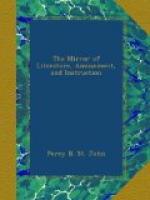As she spoke, she sunk down as one who needs rest, on a stone-seat placed on the very verge of the balcony, regardless of the storm, which now began to rise with dreadful gusts of wind, the course of which being intermitted and altered by the crags round which they howled, it seemed as if in very deed Boreas, and Eurus, and Caurus, unchaining the winds from every quarter of heaven, were contending for mastery around the convent of our Lady of Victory. Amid this tumult, and amid billows of mist which concealed the bottom of the precipice, and masses of clouds which racked tearfully over their heads, the roar of the descending waters rather resembled the fall of cataracts than the rushing of torrents of rain. The seat on which Margaret had placed herself was in a considerable degree sheltered from the storm, but its eddies, varying in every direction, often tossed aloft her dishevelled hair; and we cannot describe the appearance of her noble and beautiful, yet ghastly and wasted features, agitated strongly by anxious hesitation, and conflicting thoughts, unless to those of our readers who have had the advantage of having seen our inimitable Siddons in such a character as this.
* * * * *
As Margaret spoke, she tore from her hair the sable feather and rose, which the tempest had detached from the circlet in which they were placed, and tossed them from the battlement with a gesture of wild energy. They were instantly whirled off in a bickering eddy of the agitated clouds, which swept the feather far distant into empty space, through which the eye could not pursue it. But while that of Arthur involuntarily strove to follow its course, a contrary gust of wind caught the red rose, and drove it back against his breast, so that it was easy for him to catch hold of and retain it.
“Joy, joy, and good fortune, royal mistress!” he said, returning to her the emblematic flower; “the tempest brings back the badge of Lancaster to its proper owner.”
“I accept the omen,” said Margaret; “but it concerns yourself, noble youth and not me. The feather, which is borne away to waste and desolation, is Margaret’s emblem. My eyes will never see the restoration of the line of Lancaster. But you will live to behold it, and to aid to achieve it, and to dye our red rose deeper yet in the blood of tyrants and traitors. My thoughts are so strangely poised, that a feather or a flower may turn the scale. But my head is still giddy, and my heart sick—To-morrow you shall see another Margaret, and till then adieu.”
[Oxford attempts to win over Charles the Bold to the Lancastrian cause, and proposes an invasion of England, while Edward, with his army, is in France. Charles acquiesces; but capriciously breaks off the treaty, and rashly commences an attack on the Swiss Cantons. In his first attempt at Granson, his vanguard is cut off, and he is compelled to retreat into Burgundy. He, however, resolves to wipe out the disgrace of his defeat, raises a powerful army, and fights the memorable battle of Morat. His army is utterly ruined by the stern valour of the Swiss; he is compelled to fight for Lorraine, before Nancy; the treachery of an Italian leader of Condittierri, gives the enemy access to his camp; and his army is surprised, and routed:]




